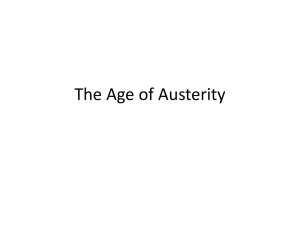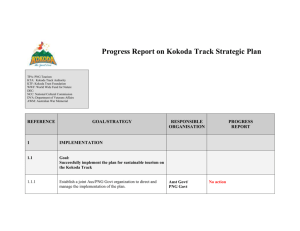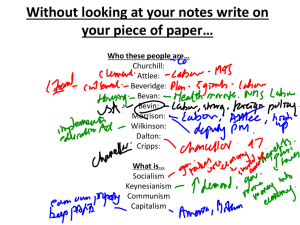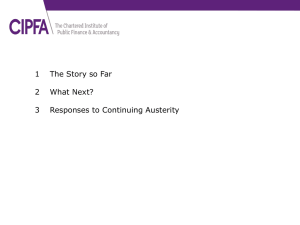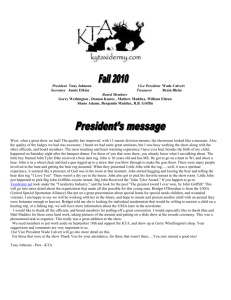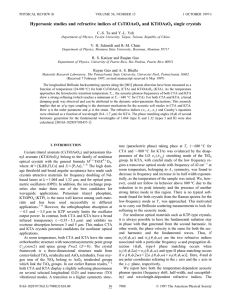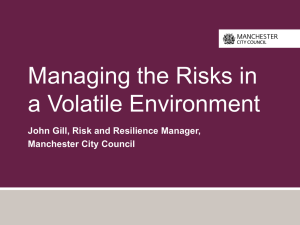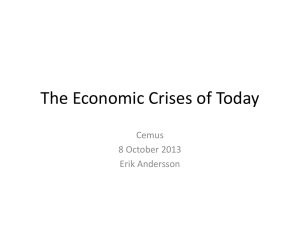Knowledge-to-Action (KTA) Models Fit for purpose? or What
advertisement
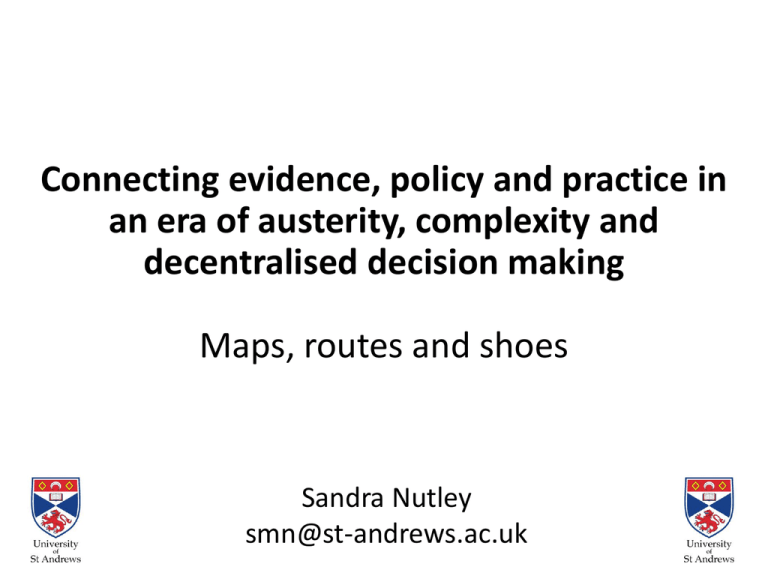
Connecting evidence, policy and practice in an era of austerity, complexity and decentralised decision making Maps, routes and shoes Sandra Nutley smn@st-andrews.ac.uk The inspiration • ‘Arguably the role of social research becomes more important to guide practice in an era of austerity than one of affluence’ (SRA, UK, 2010) • ‘There seems to be broad [bipartisan] agreement: We need an evidence-based system to guide future budget decisions that assesses the relative performance and impact of all government programs’ (Center for American Progress, USA, July 2011) Underpinning rationale: Evidence-based policies and practices ‘more likely to be better informed, more effective and less expensive’ Familiar concerns “There is nothing a politician likes so little as to be well-informed. It makes decision making so complex and difficult.” (John Maynard Keynes) “For me, politics shouldn’t be some mind-bending exercise. It’s about what you feel in your gut” (David Cameron, April 2011) Possibly not so familiar concerns Mitton et al 2007 • ‘There is actually very little evidence that can adequately inform what KTE strategies work in what contexts’ (p 756) • ‘KTE, at least as conceptualised to date, simply does not fit with the underlying politics of health policymaking’ (p 757) 1. Policy and practice context 2. Knowledge-to-action (KTA) thinking, models and initiatives 3. Implications for connecting evidence, policy and practice 1. Policy and practice context Financial austerity Outlook for Scottish public expenditure Source: Christie Commission 2011 • Concurrent huge increase in demand for public services due to demographic and social pressures • Conclusion: Radical reform required. Continuing to deliver services using current models won’t work Austerity: more a threat than opportunity? • Job cuts for researchers in government • Research and evaluation budgets slashed • Researchers & evaluators having to do more with less But • Research impact demands have raised status of applied/policyrelated research in universities • Politicians still reach for research as a tactic ‘One person's riot is another’s research grant’ Complexity: ‘wicked’ nature of many social problems • Social problems often interdependent with complex causal relationships • Knowledge base for understanding problems and possible solutions often uncertain, fragmented and contested • Stakeholders may hold divergent and extreme views, and be unfamiliar with and resist other perspectives Head, 2008 Complexity: public service systems • Various combinations of hierarchy, market, community and network approaches to service delivery • Greater decentralisation of decision making, service commissioning and procurement in many countries • E.g. Growing complexity of education systems due to: – Diversity of stakeholder preferences and expectations – More decentralised and flexible governance structures – Additional layers of governance at international and transnational levels – Rapidly changing and spreading ICTs OECD/CERI, 2007 2. KTA thinking, models and initiatives Forms of research use Direct (instrumental) – Knowledge-driven – Problem-solving (or engineering) Indirect (conceptual) – Social interaction – Enlightenment (or percolation) Symbolic – Political – Tactical Source: Weiss 1979 Impact often occurs via indirect & subtle routes, which may involve symbolic use along the way Importance of early years Restorative justice Importance of informal carers… Choose life suicide policy The happiness and well-being agenda… Enhancing self-care… Harm reduction in substance misuse… Three generations of knowledge to action (KTA) thinking • Knowledge transfer • Knowledge exchange • Knowledge integration • Knowledge a product – degree of use a function of effective packaging • Knowledge the result of social & political processes – degree of use a function of effective relationships and interaction • Knowledge embedded in systems and cultures – degree of use a function of effective integration with organisations and systems Source: Best et al 2009 Good at… …moving us away from ideas of research as “answers”, which need to be packaged … problematising “knowledge transfer” Begins to emphasise… • The importance of context, networks & systems; • Social and collective learning, and unlearning; • Interaction with other types of knowledge (tacit; experiential; political awareness); • ‘Use’ as an adaptive process - not an event; • Non-individualised embedded uses of research; • Inherent non-linearity of systems. Knowledge required for effective policies and services • Know-about problems: the nature and formation of social problems. • Know-what works: what policies, strategies or interventions will bring about desired outcomes • Know-how (to put into practice): e.g. knowledge about effective programme implementation. • Know-who (to involve): e.g. getting stakeholder buy-in and building alliances for action. • Know-why (requirements of action): relationship between values & policy/practice. • Know-whether having any impact: monitoring, evaluation and accountability Knowledge-to-action (KTA) models • A bewildering array of models, frameworks and theories (63 models identified by Ward et al 2009) • Drawn from wide range of disciplines - very varied levels of evidential support • Most models reflect first or second generation thinking • Models focused on a spectrum of concerns (Davies et al 2011): Increasing the use of explicit (what works) knowledge Implementation frameworks Creating environment that encourages engagement with wide variety of knowledge Interactional frameworks Most KTA models clustered towards the lefthand side of this spectrum KTA process often viewed as an iterative cycle, especially when concerned with instrumental use (Jones et al 2009) Knowledge-to-action initiatives Many and varied: International/national/local focus Policy/practice focus Individuals/groups/organisations/systems focus Top down Evidence to practice No child left behind (NCLB), USA Bottom up Practice to evidence Centre for Center for Court Project Oracle, Effective Services, Innovation, NY, London Ireland USA NB: Researcher/university driven initiatives still often based on knowledge push models (Qi & Leven, 2011) 3. Implications for connecting evidence, policy and practice Those wishing to negotiate the research use/impact terrain… • Need good maps of the policy/practice context at different levels of detail Context matters: factors explaining use/non-use • • • • • Political culture factors – e.g. shared or conflicting values, adversarial or consensual political frameworks, extent of deference to technical expertise Policy domain factors – e.g. settled or contentious problems, actors, structures and issue histories Coordination and integration capacities – e.g. extent of central control, system capacities for policy development and implementation Organisational capacities and processes – e.g. supply of analytical skills, receptivity to outside information, routine requirements and procedures Cross-sectoral relationships – institutionalisation of crosssectoral processes such as bridging organisations and networks Head (2011) Those wishing to negotiate the research use/impact terrain… • Need good maps of the policy/practice context at different levels of detail • Will find many generic route guides, not all of which are based on fieldwork! • Often not clear what routes to pursue in which context • And to complicate matters, researchers need to decide which shoes they want to wear… Researcher rightly take different stances in relation to policy/practice • The consensual approach – working with the grain of current policy/practice. • The critical and contentious approach – “keeping the system honest”. • Paradigm challenging – subverting current thinking and perhaps proposing new principles for action. There are some schemas of the relationship between certain routes and aspects of context that are worthy of further consideration and development Contandriopoulos et al 2010 Models of use in relation to cost-sharing and polarisation dimensions of the context Fazekas & Burns 2011 In the meantime, some general guidance based on RURU’s work Research Unit for Research Utilisation (RURU) – developing cross-sector knowledge on research use Generic features of effective practices to increase research use Research must be translated - adaptation of findings to specific policy and practice contexts Ownership is key – though there are exceptions where implementation is received or perceived as coercive Need for enthusiasts - champions - personal contact is most effective Contextual analysis - understanding and targeting specific barriers to, and enablers of, change Credibility - strong evidence from trusted source, inc. endorsement from opinion leaders Leadership - within research impact settings Support - ongoing financial, technical & emotional support Integration - of new activities with existing systems and activities Source: Nutley et al 2007 Thank You! smn@st-andrews.ac.uk Research Unit for Research Utilisation (www.ruru.ac.uk – new website coming soon!) Key references • Best A, Terpstra JL, Moor G, Riley B, Norman CD, Glasgow RE, (2009) "Building knowledge integration systems for evidence-informed decisions", Journal of Health Organization and Management, 23(6): 627 641 • Contandriopoulos, D., Lemire, M., Denis, J-L. & Tremblay, E. (2010) “Knowledge Exchange Processes in Organizations and Policy Arenas: A Narrative Systematic Review of the Literature” The Milbank Quarterly 88(4): 444-83. • Davies HTO, Powell A, Ward V and Smith S (2011) Supporting NHS Scotland in developing a new Knowledge-to-Action Model, Unpublished report available from University of St Andrews • Fazekas M & Burns T (2011) Exploring the complex interaction between governance and knowledge, A draft EDU/CERI paper, OECD • Head B (2008) “Assessing network-based collaborations” Public Management Review, 10(6): 733-749 • Head B (2011) “Comparative Analysis of Research/Policy Relationships – challenges and agendas”, presentation to panel on the comparative study of EBPP, IRSPM conference, Dublin, 12 April References (cont.) • Jones et al (2009) Knowledge, policy and power: six dimensions of the knowledge-development policy interface, London: ODI • Mitton et al (2007) “Knowledge transfer and exchange: Review and synthesis of the literature”, The Milbank Quarterly 85(4):729-768 • Nutley, S.M., Walter, I., & Davies, H.T.O. (2007) Using evidence: how research can inform public services. Policy Press. Bristol. • Puttick R ed (2011) Using evidence to improve social policy and practice: perspectives on how research and evidence can influence decisionmaking, London: Alliance for Useful Evidence/NESTA • Ward, V., House, A., & Hamer, S. (2009) “Developing a framework for transferring knowledge into action: a thematic analysis of the literature” Journal of Health Services Research and Policy 14: 156-164. • Weiss CH (1999) “The interface between evaluation and public policy”, Evaluation 5(4): 468-486
